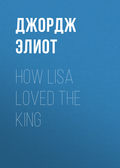
Джордж Элиот
Brother Jacob
Jacob turned his head on one side, looked first at his brother and then at the hole, like a reflective monkey, and, finally, laid the box of guineas in the hole with much decision. David made haste to add every one of the stray coins, put on the lid, and covered it well with earth, saying in his meet coaxing tone—
“Take ’m out to-morrow, Jacob; all for Jacob! Hush—sh—sh!”
Jacob, to whom this once indifferent brother had all at once become a sort of sweet-tasted fetish, stroked David’s best coat with his adhesive fingers, and then hugged him with an accompaniment of that mingled chuckling and gurgling by which he was accustomed to express the milder passions. But if he had chosen to bite a small morsel out of his beneficent brother’s cheek, David would have been obliged to bear it.
And here I must pause, to point out to you the short-sightedness of human contrivance. This ingenious young man, Mr. David Faux, thought he had achieved a triumph of cunning when he had associated himself in his brother’s rudimentary mind with the flavour of yellow lozenges. But he had yet to learn that it is a dreadful thing to make an idiot fond of you, when you yourself are not of an affectionate disposition: especially an idiot with a pitchfork—obviously a difficult friend to shake off by rough usage.
It may seem to you rather a blundering contrivance for a clever young man to bury the guineas. But, if everything had turned out as David had calculated, you would have seen that his plan was worthy of his talents. The guineas would have lain safely in the earth while the theft was discovered, and David, with the calm of conscious innocence, would have lingered at home, reluctant to say good-bye to his dear mother while she was in grief about her guineas; till at length, on the eve of his departure, he would have disinterred them in the strictest privacy, and carried them on his own person without inconvenience. But David, you perceive, had reckoned without his host, or, to speak more precisely, without his idiot brother—an item of so uncertain and fluctuating a character, that I doubt whether he would not have puzzled the astute heroes of M. de Balzac, whose foresight is so remarkably at home in the future.
It was clear to David now that he had only one alternative before him: he must either renounce the guineas, by quietly putting them back in his mother’s drawer (a course not unattended with difficulty); or he must leave more than a suspicion behind him, by departing early the next morning without giving notice, and with the guineas in his pocket. For if he gave notice that he was going, his mother, he knew, would insist on fetching from her box of guineas the three she had always promised him as his share; indeed, in his original plan, he had counted on this as a means by which the theft would be discovered under circumstances that would themselves speak for his innocence; but now, as I need hardly explain, that well-combined plan was completely frustrated. Even if David could have bribed Jacob with perpetual lozenges, an idiot’s secrecy is itself betrayal. He dared not even go to tea at Mr. Lunn’s, for in that case he would have lost sight of Jacob, who, in his impatience for the crop of lozenges, might scratch up the box again while he was absent, and carry it home—depriving him at once of reputation and guineas. No! he must think of nothing all the rest of this day, but of coaxing Jacob and keeping him out of mischief. It was a fatiguing and anxious evening to David; nevertheless, he dared not go to sleep without tying a piece of string to his thumb and great toe, to secure his frequent waking; for he meant to be up with the first peep of dawn, and be far out of reach before breakfast-time. His father, he thought, would certainly cut him off with a shilling; but what then? Such a striking young man as he would be sure to be well received in the West Indies: in foreign countries there are always openings—even for cats. It was probable that some Princess Yarico would want him to marry her, and make him presents of very large jewels beforehand; after which, he needn’t marry her unless he liked. David had made up his mind not to steal any more, even from people who were fond of him: it was an unpleasant way of making your fortune in a world where you were likely to surprised in the act by brothers. Such alarms did not agree with David’s constitution, and he had felt so much nausea this evening that no doubt his liver was affected. Besides, he would have been greatly hurt not to be thought well of in the world: he always meant to make a figure, and be thought worthy of the best seats and the best morsels.
Ruminating to this effect on the brilliant future in reserve for him, David by the help of his check-string kept himself on the alert to seize the time of earliest dawn for his rising and departure. His brothers, of course, were early risers, but he should anticipate them by at least an hour and a half, and the little room which he had to himself as only an occasional visitor, had its window over the horse-block, so that he could slip out through the window without the least difficulty. Jacob, the horrible Jacob, had an awkward trick of getting up before everybody else, to stem his hunger by emptying the milk-bowl that was “duly set” for him; but of late he had taken to sleeping in the hay-loft, and if he came into the house, it would be on the opposite side to that from which David was making his exit. There was no need to think of Jacob; yet David was liberal enough to bestow a curse on him—it was the only thing he ever did bestow gratuitously. His small bundle of clothes was ready packed, and he was soon treading lightly on the steps of the horse-block, soon walking at a smart pace across the fields towards the thicket. It would take him no more than two minutes to get out the box; he could make out the tree it was under by the pale strip where the bark was off, although the dawning light was rather dimmer in the thicket. But what, in the name of—burnt pastry—was that large body with a staff planted beside it, close at the foot of the ash-tree? David paused, not to make up his mind as to the nature of the apparition—he had not the happiness of doubting for a moment that the staff was Jacob’s pitchfork—but to gather the self-command necessary for addressing his brother with a sufficiently honeyed accent. Jacob was absorbed in scratching up the earth, and had not heard David’s approach.
“I say, Jacob,” said David in a loud whisper, just as the tin box was lifted out of the hole.
Jacob looked up, and discerning his sweet-flavoured brother, nodded and grinned in the dim light in a way that made him seem to David like a triumphant demon. If he had been of an impetuous disposition, he would have snatched the pitchfork from the ground and impaled this fraternal demon. But David was by no means impetuous; he was a young man greatly given to calculate consequences, a habit which has been held to be the foundation of virtue. But somehow it had not precisely that effect in David: he calculated whether an action would harm himself, or whether it would only harm other people. In the former case he was very timid about satisfying his immediate desires, but in the latter he would risk the result with much courage.
“Give it me, Jacob,” he said, stooping down and patting his brother. “Let us see.”
Jacob, finding the lid rather tight, gave the box to his brother in perfect faith. David raised the lids and shook his head, while Jacob put his finger in and took out a guinea to taste whether the metamorphosis into lozenges was complete and satisfactory.
“No, Jacob; too soon, too soon,” said David, when the guinea had been tasted. “Give it me; we’ll go and bury it somewhere else; we’ll put it in yonder,” he added, pointing vaguely toward the distance.
David screwed on the lid, while Jacob, looking grave, rose and grasped his pitchfork. Then, seeing David’s bundle, he snatched it, like a too officious Newfoundland, stuck his pitchfork into it and carried it over his shoulder in triumph as he accompanied David and the box out of the thicket.
What on earth was David to do? It would have been easy to frown at Jacob, and kick him, and order him to get away; but David dared as soon have kicked the bull. Jacob was quiet as long as he was treated indulgently; but on the slightest show of anger, he became unmanageable, and was liable to fits of fury which would have made him formidable even without his pitchfork. There was no mastery to be obtained over him except by kindness or guile. David tried guile.
“Go, Jacob,” he said, when they were out of the thicket—pointing towards the house as he spoke; “go and fetch me a spade—a spade. But give me the bundle,” he added, trying to reach it from the fork, where it hung high above Jacob’s tall shoulder.
But Jacob showed as much alacrity in obeying as a wasp shows in leaving a sugar-basin. Near David, he felt himself in the vicinity of lozenges: he chuckled and rubbed his brother’s back, brandishing the bundle higher out of reach. David, with an inward groan, changed his tactics, and walked on as fast as he could. It was not safe to linger. Jacob would get tired of following him, or, at all events, could be eluded. If they could once get to the distant highroad, a coach would overtake them, David would mount it, having previously by some ingenious means secured his bundle, and then Jacob might howl and flourish his pitchfork as much as he liked. Meanwhile he was under the fatal necessity of being very kind to this ogre, and of providing a large breakfast for him when they stopped at a roadside inn. It was already three hours since they had started, and David was tired. Would no coach be coming up soon? he inquired. No coach for the next two hours. But there was a carrier’s cart to come immediately, on its way to the next town. If he could slip out, even leaving his bundle behind, and get into the cart without Jacob! But there was a new obstacle. Jacob had recently discovered a remnant of sugar-candy in one of his brother’s tail-pockets; and, since then, had cautiously kept his hold on that limb of the garment, perhaps with an expectation that there would be a further development of sugar-candy after a longer or shorter interval. Now every one who has worn a coat will understand the sensibilities that must keep a man from starting away in a hurry when there is a grasp on his coat-tail. David looked forward to being well received among strangers, but it might make a difference if he had only one tail to his coat.
He felt himself in a cold perspiration. He could walk no more: he must get into the cart and let Jacob get in with him. Presently a cheering idea occurred to him: after so large a breakfast, Jacob would be sure to go to sleep in the cart; you see at once that David meant to seize his bundle, jump out, and be free. His expectation was partly fulfilled: Jacob did go to sleep in the cart, but it was in a peculiar attitude—it was with his arms tightly fastened round his dear brother’s body; and if ever David attempted to move, the grasp tightened with the force of an affectionate boa-constrictor.
“Th’ innicent’s fond on you,” observed the carrier, thinking that David was probably an amiable brother, and wishing to pay him a compliment.
David groaned. The ways of thieving were not ways of pleasantness. Oh, why had he an idiot brother? Oh, why, in general, was the world so constituted that a man could not take his mother’s guineas comfortably? David became grimly speculative.
Copious dinner at noon for Jacob; but little dinner, because little appetite, for David. Instead of eating, he plied Jacob with beer; for through this liberality he descried a hope. Jacob fell into a dead sleep, at last, without having his arms round David, who paid the reckoning, took his bundle, and walked off. In another half-hour he was on the coach on his way to Liverpool, smiling the smile of the triumphant wicked. He was rid of Jacob—he was bound for the Indies, where a gullible princess awaited him. He would never steal any more, but there would be no need; he would show himself so deserving, that people would make him presents freely. He must give up the notion of his father’s legacy; but it was not likely he would ever want that trifle; and even if he did—why, it was a compensation to think that in being for ever divided from his family he was divided from Jacob, more terrible than Gorgon or Demogorgon to David’s timid green eyes. Thank heaven, he should never see Jacob any more!






